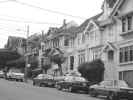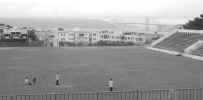District 1: our town
 It’s
all one neighborhood, this neat near-rectangle that
begins at the foot of St. Ignatius Heights in the
middle of the city and ends three miles later at the
Pacific Ocean. Political analysts like David Binder,
who are trained to look for voting nuances, may divide
it into Inner, Middle, and Outer. But essentially, it’s
all the Richmond.
It’s
all one neighborhood, this neat near-rectangle that
begins at the foot of St. Ignatius Heights in the
middle of the city and ends three miles later at the
Pacific Ocean. Political analysts like David Binder,
who are trained to look for voting nuances, may divide
it into Inner, Middle, and Outer. But essentially, it’s
all the Richmond.
"Great Sand Waste" is how
early maps described the area. And indeed, photographs
taken in the mid-nineteenth century show the first
Cliff House washed by waves of scraggly dunes. Mark
Twain famously visited in 1864, rising unaccustomedly
early to travel by buggy out Point Lobos Road until he
reached the seaside restaurant, "perched…like a
castle by the Rhine, with countless sea-lions rolling
their unwieldy bulks on the rocks within
rifle-shot." He would have stopped at what is now
Geary and 6th Avenue to pay a 75 cent toll,
and then continued on through a "vast
territory" dotted with an assortment of
"little homesteads by the way, Dr. Rowell’s
arena castle, and Zeke Wilson’s Bleak House in the
Sand."
It wasn’t until the early
twentieth century that Mayor Adolph Sutro erected his
own magnificent mansion and self-named baths in an
effort to attract settlers to "the dunes."
The strategy worked. By the 1930s, thousands of houses
lined the gridded streets. The area became a mecca for
a variety of pilgrims: Russians, Eastern European
Jews, the French, the Irish, Armenians and other
Central Europeans — the list goes on and on. In
recent years, Asians have joined the mix, giving the
district the second-largest Asian population in the
city. Chinese Americans by themselves account for more
than a third of the residents.
Politically, the Richmond is San
Francisco writ small, with a few exceptions. Its age
distribution and renter/owner breakdown (65 percent/35
percent) are nearly identical. It has a few
more females — 53 percent, compared with 50 percent
citywide. And its residents are slightly better
off — with a $36,354 median income compared with an
overall income of $33,414. To date, its large
percentage of Asians has not had a noticeable affect
on election results, because the people who actually
vote are predominately Caucasian. Support has been
only slightly stronger for a candidate like
Michael Yaki or Leland Yee. To date. A vigorous
voter-education drive could change all that.
 The
Richmond is a neighborhood of homes, a fog-swept
Grover’s Corners, if you will. As a harbinger of
electoral things-to-come, it was fitting that the
first League of Women Voters candidate forum took
place within its precincts. Last Tuesday, about a
hundred people converged on Washington High School’s
gleaming white complex of buildings to take the
measure of five men and women who want to represent
them as supervisor. KGO anchor Cheryl Jennings,
hospitable in blonde, played the role of Stage Manager
in this restaging of Thornton Wilder’s classic.
The
Richmond is a neighborhood of homes, a fog-swept
Grover’s Corners, if you will. As a harbinger of
electoral things-to-come, it was fitting that the
first League of Women Voters candidate forum took
place within its precincts. Last Tuesday, about a
hundred people converged on Washington High School’s
gleaming white complex of buildings to take the
measure of five men and women who want to represent
them as supervisor. KGO anchor Cheryl Jennings,
hospitable in blonde, played the role of Stage Manager
in this restaging of Thornton Wilder’s classic.
Enter the cast (with a
characterization that each will undoubtedly protest).
 the
young man of reason: Jason
Jungreis (415 750-0830). An attorney and Superior
court judge pro tem, Jungreis is running a
determinedly bare-bones low-budget campaign: "I
have no independent wealth and I am not seeking
campaign funding." Money may be scarce, but
thoughts are plentiful: "My primary interests are
to help the City become more fiscally responsible, and
to introduce a host of new ideas to make the City more
livable." Jungreis has organized the somewhat
disparate host into a pamphlet, to which he refers
people seeking something more than sound bites. They
range widely, from "Make every effort to avoid
funding projects through costly bond measures" to
"Invite the Treasure Island installation of a
permanent Burning Man exhibit and annual
festival."
the
young man of reason: Jason
Jungreis (415 750-0830). An attorney and Superior
court judge pro tem, Jungreis is running a
determinedly bare-bones low-budget campaign: "I
have no independent wealth and I am not seeking
campaign funding." Money may be scarce, but
thoughts are plentiful: "My primary interests are
to help the City become more fiscally responsible, and
to introduce a host of new ideas to make the City more
livable." Jungreis has organized the somewhat
disparate host into a pamphlet, to which he refers
people seeking something more than sound bites. They
range widely, from "Make every effort to avoid
funding projects through costly bond measures" to
"Invite the Treasure Island installation of a
permanent Burning Man exhibit and annual
festival."
 the
older man of experience: Ron
"Dr. K" Konopaski (415 668-9800). Dr. K
explains his candidacy with a quote from Winston
Churchill: "You make a living from what you get;
you make a life from what you do for other
people." His host of ideas are nearly as
wide-ranging as his young opponent’s, but he adds a
practical structure derived from the scientific method
that underlay his dental practice: examine the
situation; identify its problems; create solution
options; set goals; monitor progress; install
maintenance systems. His is the voice of the honest,
hardworking yeoman, willing to leave his plow for the
service of his community.
the
older man of experience: Ron
"Dr. K" Konopaski (415 668-9800). Dr. K
explains his candidacy with a quote from Winston
Churchill: "You make a living from what you get;
you make a life from what you do for other
people." His host of ideas are nearly as
wide-ranging as his young opponent’s, but he adds a
practical structure derived from the scientific method
that underlay his dental practice: examine the
situation; identify its problems; create solution
options; set goals; monitor progress; install
maintenance systems. His is the voice of the honest,
hardworking yeoman, willing to leave his plow for the
service of his community.
 the
machine buster: Rose
Tsai (415 831-8721). Sporting a less combative
slogan — "Walk a new path with Rose Tsai"
— the veteran opponent of Our Mayor has softened her
style since her 1998 campaign, when she ran under the
banner "She’ll stand up to Willie Brown."
But her message still hits hard: "The city has a
budget of $4.4 billion — billion — but the
quality of life is down." She seems to enjoy the
excitement of the supervisorial scrum, pointing with a
smile to her own activist history as she proposes
"to put one of our own neighborhood leaders in
office to reform City Hall."
the
machine buster: Rose
Tsai (415 831-8721). Sporting a less combative
slogan — "Walk a new path with Rose Tsai"
— the veteran opponent of Our Mayor has softened her
style since her 1998 campaign, when she ran under the
banner "She’ll stand up to Willie Brown."
But her message still hits hard: "The city has a
budget of $4.4 billion — billion — but the
quality of life is down." She seems to enjoy the
excitement of the supervisorial scrum, pointing with a
smile to her own activist history as she proposes
"to put one of our own neighborhood leaders in
office to reform City Hall."
 the
good citizen: Jake McGoldrick (415 752-1727).
McGoldrick’s career is a playwright’s dream. A
construction worker who put himself through college
and eventually became a member of the USF faculty, he
has spent the past fifteen years on the playing fields
of grass-roots politics. He led an early fight against
local massive construction projects known as
"Richmond Specials," which would drive out
working families, and he has continued to speak
bluntly on neighborhood issues ever since.
Acknowledging his position between Rose Tsai and
Michael Yaki, he emphasizes his reputation for
fairness, describing himself somewhat disingenuously
as "the only major candidate in District 1 who
will be neither a rubber stamp nor an obstructionist
to the current mayor." His supporters include Tom
Ammiano, Debra Walker, and Sue Hestor.
the
good citizen: Jake McGoldrick (415 752-1727).
McGoldrick’s career is a playwright’s dream. A
construction worker who put himself through college
and eventually became a member of the USF faculty, he
has spent the past fifteen years on the playing fields
of grass-roots politics. He led an early fight against
local massive construction projects known as
"Richmond Specials," which would drive out
working families, and he has continued to speak
bluntly on neighborhood issues ever since.
Acknowledging his position between Rose Tsai and
Michael Yaki, he emphasizes his reputation for
fairness, describing himself somewhat disingenuously
as "the only major candidate in District 1 who
will be neither a rubber stamp nor an obstructionist
to the current mayor." His supporters include Tom
Ammiano, Debra Walker, and Sue Hestor.
 the
mayor’s man: Michael Yaki (415 333-9946).
Appointed supervisor in early 1996 and elected later
that year, Yaki is running on his "experience and
record of effectiveness." He speaks eloquently of
his love for San Francisco and bases his responses to
questions on successful action he has taken,
demonstrating a knowledge of city government’s inner
workings that no outsider could have. Although the
general public would identify him with Our Mayor’s
policies, in the debate he emphasizes his role as a
Richmond man.
the
mayor’s man: Michael Yaki (415 333-9946).
Appointed supervisor in early 1996 and elected later
that year, Yaki is running on his "experience and
record of effectiveness." He speaks eloquently of
his love for San Francisco and bases his responses to
questions on successful action he has taken,
demonstrating a knowledge of city government’s inner
workings that no outsider could have. Although the
general public would identify him with Our Mayor’s
policies, in the debate he emphasizes his role as a
Richmond man.
The convocation at Washington High
demonstrated once again that political pontifications
aren’t worth the paper they’re printed on. A
recent column by Ken Garcia voiced what must be a
common opinion in some circles: "I still think
district elections are a bad choice for San Francisco,
which is too small to be sliced into tiny legislative
areas, is too full of political kooks, and has far too
many citywide problems and concerns for 11 precinct
captains to handle." The Our Town Five would have
hooted in derision. When asked how they would balance
the needs of their district and the city as a whole,
the candidates to a person declared it was a
non-issue. They spoke of interconnectedness and the
dangers of Balkanization. Tsai voiced the sentiments
of them all, "What’s best for the city as a
whole is always best for each neighborhood, so that no
neighborhood is sacrificed for the interests of
another."
Their refusal to play the
be-divided-and-conquered game is echoed by the results
of a survey published in the August Richmond Review
that identifies the district’s most urgent concerns.
At the top of the list were safety (particularly
pedestrian and traffic), housing, parking,
transportation, and recreation. The order might change
in other parts of town, but it’s hard to imagine any
difference in the elements.
 These
neighborhood candidates may be better versed in the
classics than some of the downtown denizens. It’s
easy to imagine them declaiming earnestly, "If
you prick us, do we not bleed? If you tickle us, do we
not laugh? If you poison us, do we not die?" And
the most ominous question, "If you wrong us,
shall we not revenge?" A central government
ignores local needs at its own peril.
These
neighborhood candidates may be better versed in the
classics than some of the downtown denizens. It’s
easy to imagine them declaiming earnestly, "If
you prick us, do we not bleed? If you tickle us, do we
not laugh? If you poison us, do we not die?" And
the most ominous question, "If you wrong us,
shall we not revenge?" A central government
ignores local needs at its own peril.
The forum came to an end, and the
audience streamed down the stairs overlooking the
sunken football field and the bay beyond. At this
point, the Stage Manager of Our Town would have
said, "Now there are some things we all know, but
we don’t take’m out and look at’m very
often." High time we did.